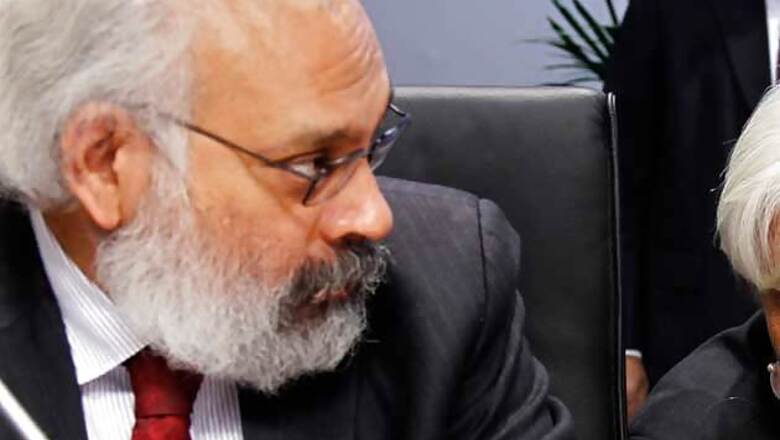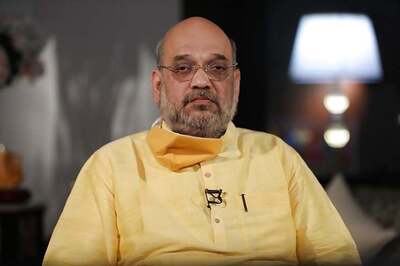
views
New Delhi: With Vote on Account getting closer, experts debate if Finance Minister P Chidambaram will use the opportunity to announce changes in taxes and subsidies, a clear departure from standard practice. Speaking to Sonia Shenoy on CNBC-TV18, former RBI deputy governor and current directior at Brooking India Subir Gokarn said he belongs to the camp that is looking at the new government for full and legitimate budget in July.
VoA to be held on Monday happens to be first interim Budget presented by Chidambaram.
Pointing at India's widening deficit, Gokarn said containing the menace called subsidy should be new government's most important task. He did not specify which government is likely to come to power post elections.
Below is the verbatim transcript of Subir Gokarn's interview withSonia Shenoy on CNBC-TV18.
Sonia: What is the agenda that you would like the new government, whichever government comes to power to set as far as the fiscal situation is concerned? What are the one-two or three rules that you would like the new government to set first up?
Gokarn: Speaking specifically about the fiscal situation, I think that three issues, which we need to get to grips with very quickly. One is clearly what has been talked about which is the overall size of the fiscal deficit and the priority on containing it, bringing it back to what the Fiscal Responsibility and Budget Management (FRBM) roadmap from 2003 to 2008 had laid out, which is essentially trying to bring the revenue deficit to zero and using whatever you borrow to create assets. I think that is a very important restructuring that we need to see.
But within the revenue deficit, the problem over the last few years has been subsidies and we have to find a way to contain subsidies. We had some reference in the budget of 2012 to new FRBM which would have an explicit cap on subsidies and that is a good way to go. That locks in governments regardless of political orientation and I think we need to move back to this more formal system of fiscal rules to try and get some predictability and some commitment into place. Very important element in this is the goods and services tax (GST) - I am very much in favour of the GST and I think the benefits we saw from the value added tax (VAT) at the state level, which is a very sharp increase in revenue collection because of higher compliance and that is the important thing.
Those will flow to the overall fiscal system, both center and states through a GST rule and that is very important and I get back to my first point, which is the most important. In 2008, we had capital spending as a share of government expenditure at around 23 per cent. Spending almost a quarter of its total spend on asset formation. Today that number has gone down to 11-12 somewhere thereabouts. So the government is spending way too much on consumption and way too little on asset formation. If we don't get that balance right, we are compromising hugely on the kind of infrastructure requirements that we need to fulfill in order to sustain a higher rate of growth.
Sonia: From the Vote on Account (VoA) on Monday, what are you expecting not so much the number for FY15 which is expected to be at 4.2 percent fiscal deficit but how the government may arrive at that number, what is your expectation this time?
Gokarn: I think that we are spending way too much time trying to project what the VoA is going to say. Mechanically it is essentially a way for money to continue to flow into government. It is not a policy statement, it cannot be a policy statement. There are two components to it which we can look at separately. One is the numbers themselves, which will give you a sense of where the fiscal situation is vis-à-vis the current year and at the end of 2013-2014 and some assessment of what the government might wanted to be over the next year if it were in office.
But beyond that is the rhetoric, is the statement that it is going to make that the minister is going to make about what the government's overall intentions are, some rationale I would expect, some explanation for why things are the way they are and how it will go about correcting them essentially if it were to come back to power.From purely fiscal viewpoint, we have to wait till a fully legitimate budget is presented which is something that parliament has to vote on and that is going to happen at the earliest in July.
But I think even that timeframe between the formation of new government particularly if it is not the same configuration to expect some radical change in the fiscal situation in the space of a few weeks, is being a bit over optimistic.We should be looking at some sort of a holding action if we will to try and prevent the fiscal situation getting completely out of control in the new budget so certainly signals that they are going to take necessary steps and look at 2015-2016 budget as the one in which a concrete and long-term fiscal strategy is going to be put in place. So we are going to be waiting for a year to see those signals materialize.



















Comments
0 comment